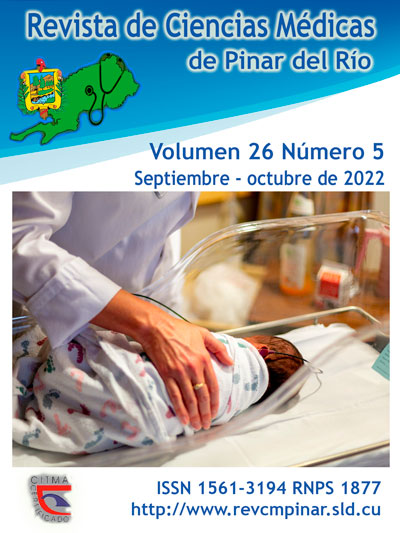Characterization of student qualities for pedagogical motivation in undergraduates
Keywords:
SOCIAL SKILLS, STUDENT, COMMUNICATION, MOTIVATION.Abstract
Introduction: the teaching communicative process demands the training of students from the undergraduate level for pedagogical motivation.
Objective: to characterize student qualities for pedagogical motivation in medical students of the University of Medical Sciences of Villa Clara in the period 2021-2022.
Methods: a cross-sectional descriptive study was carried out during the period from September 2021 to October 2022. The population consisted of 40 first year medical students. Theoretical, systemic, historical-logical and analytical-synthetic methods were used, as well as empirical methods: documentary analysis and student questionnaire.
Results: it was verified through the results that first-year medical students did not recognize as an essential quality the communicative ability to feel motivation for teaching.
Conclusions: it was also corroborated the need to develop integrated educational actions to encourage favorable qualities in undergraduate students of Medicine from the teaching-educational context towards the future achievement of a qualified teaching staff.
Downloads
References
1. Lemus Lago ER, Pérez Sánchez AM. Desarrollo social a través del modelo de formación del especialista en Medicina General Integral en Cuba. Educ Med Super [Internet]. 2013 [citado 20/03/2022]; 27(3): [aprox. 12 p.]. Disponible en: http://scielo.sld.cu/scielo.php?script=sci_arttext&pid=S0864-21412013000300013
2. Rivera MN. Generalidades del proceso comunicativo. En: Álvarez SR. Medicina General Integral: ciencia y humanismo. 3 ed. La Habana: Editorial Ciencias Médicas; 2014.
3. Mariño Castellanos, JT. El enfoque creativo vivencial. Curso Preevento. Evento Cuba-México. Edición Digital. Santiago de Cuba; 2011 [citado 20/03/2022]. Disponible en: http://ecured/Juana_Teresa_Mari%C3%B1o_Castellanos
4. Cruz Gavilanes MT, PE Rodríguez Pañora, MT Acero Amay, Cruz Gavilanes YN. La motivación de los estudiantes de enfermería. Dominio de las ciencias [Internet]. 2017 [citado 20/03/2022]; 3(4); 570-587 Disponible en: https://dominiodelasciencias.com/ojs/index.php/es/article/view/713
5. Alemán-Marichal B, Navarro-de-Armas O, Suárez-Díaz R, Izquierdo-Barceló Y, Encinas-Alemán T. La motivación en el contexto del proceso enseñanza-aprendizaje en carreras de las Ciencias Médicas. Revista Médica Electrónica [Internet]. 2018 [citado 20/03/2022]; 40(4): [aprox. 8 p.]. Disponible en: http://www.revmedicaelectronica.sld.cu/index.php/rme/article/view/2307
6. Naipe - Delgado M, Salabert- Tortoló I, Morales - Díaz M, Mestre- Cárdenas V, Garriga-Alfonso N, Toledo - Martínez T. La motivación en los estudiantes de primer año de la carrera de Medicina. Curso 2015- 2016. Rev Med Electron [ Internet]. 2017 [citado 20/03/2022]; 39(4): [aprox. 9 p.]. Disponible en: http://scielo.sld.cu/scielo.php?script=sci_abstract&pid=s1684-18242017000400006
7. Domínguez García L. Psicología del desarrollo. Problema, principios y categorías. La Habana: Editorial Félix Varela; 2007. http://newpsi.bvs-psi.org.br/ebooks2010/en/Acervo_files/LibroLauraDominguez.pdf
8. Hérnández, R, Férnandez, C, Baptista, P. Metodología de la Investigación (6ta ed.). México D.F: Mc Graw-Hill Editorial; 2015. https://academia.utp.edu.co/grupobasicoclinicayaplicadas/files/2013/06/Metodolog%C3%ADa-de-la-Investigaci%C3%B3n.pdf
9. García, I. El consentimiento informado; una acción imprescindible en la investigación médica. Rev Cubana Estomatol [Internet]. 2009 [citado 20/03/2022]; 46(1): [aprox. 9 p.]. Disponible en http://scielo.sld.cu/scielo.php?script=sci_arttext&pid=S0034-75072009000100007
10. Linares, MP, Díaz, JR. Buenas prácticas. Comunicar e informar. La Habana: Editorial Academia; 2012.
11. Molerio, LE, Torres, JA. Metodología para el perfeccionamiento de los tutores de formación de los estudiantes de pregrado. EDUMECENTRO [Internet]. 2013 Ago [citado 20/03/2022]; 5(2): [aprox. 12 p.]. Disponible en: http://scielo.sld.cu/scielo.php?script=sci_arttext&pid=S2077-28742013000200011
12. Cáceres Mesa M, et al. La formación pedagógica de los profesores universitarios. Una propuesta en el proceso de profesionalización. Universidad de Cienfuegos, Cuba; 2019 [citado 20/03/2022]. Disponible en: https://rieoei.org/RIE/article/view/2900/3825
13. Montoya Castillo I. Las habilidades para la vida. Washington D.C: Editorial PAHO; 2015.
14. Blanco Pérez, A. y Recarey, S. Acerca del rol profesional del maestro. En Profesionalidad y práctica pedagógica. Editorial Pueblo y Educación. La Habana. Cuba; 2017.
15. Cuellar Álvarez J, Martín Hernández L, Cabrera Chávez I. Propuesta de guía psicoeducativa encaminada a mejorar la comunicación educativa-docente estomatológica. EDUMECENTRO [Internet]. 2014 [citado 20/03/2022]; 6(1): [aprox. 15 p.]. Disponible en: http://scielo.sld.cu/scielo.php?script=sci_arttext&pid=S207728742014000100016&lng=es&nrm=iso&tlng=es
16. Fernández Capote MM, Campello Trujillo LE, Fernández Queija Y, Hernández Cuétara L. Desafíos y alternativas de la Universidad de Ciencias Médicas Cubana. RevMédElectrón [Internet]. 2018 [citado 20/03/2022]; 40(6). Disponible en: http://www.revmedicaelectronica.sld.cu/index.php/rme/article/view/2529/4121
Downloads
Published
How to Cite
Issue
Section
License
Authors who have publications with this journal agree to the following terms: Authors will retain their copyrights and grant the journal the right of first publication of their work, which will be publication of their work, which will be simultaneously subject to the Creative Commons Attribution License (CC-BY-NC 4.0) that allows third parties to share the work as long as its author and first publication in this journal are indicated.
Authors may adopt other non-exclusive license agreements for distribution of the published version of the work (e.g.: deposit it in an institutional telematic archive or publish it in a volume). Likewise, and according to the recommendations of the Medical Sciences Editorial (ECIMED), authors must declare in each article their contribution according to the CRediT taxonomy (contributor roles). This taxonomy includes 14 roles, which can be used to represent the tasks typically performed by contributors in scientific academic production. It should be consulted in monograph) whenever initial publication in this journal is indicated. Authors are allowed and encouraged to disseminate their work through the Internet (e.g., in institutional telematic archives or on their web page) before and during the submission process, which may produce interesting exchanges and increase citations of the published work. (See The effect of open access). https://casrai.org/credit/



